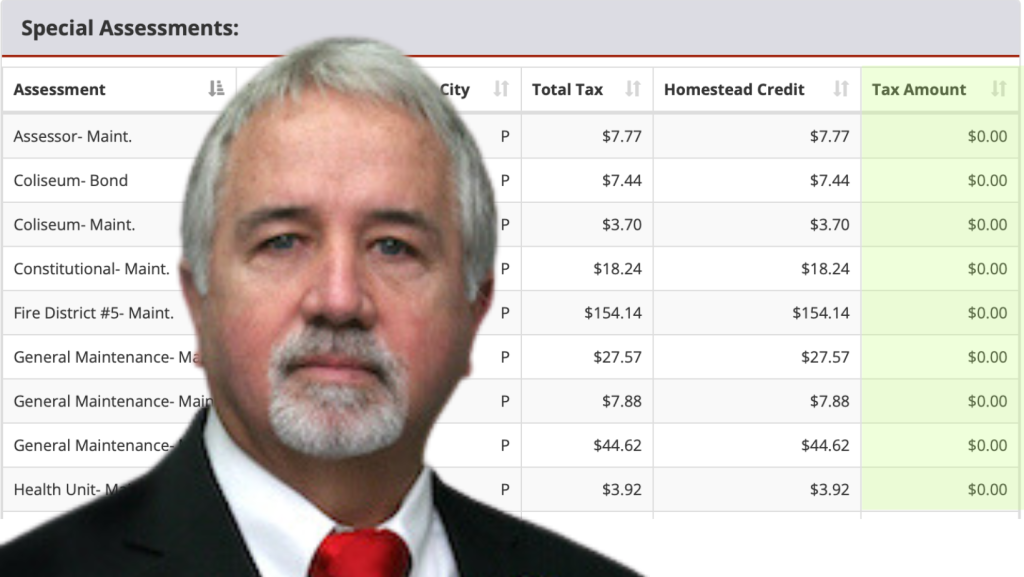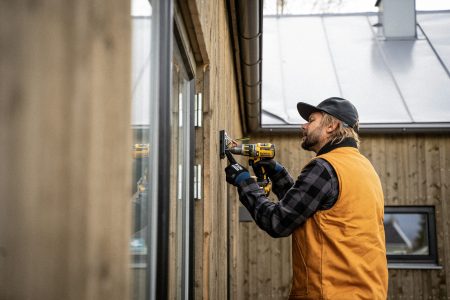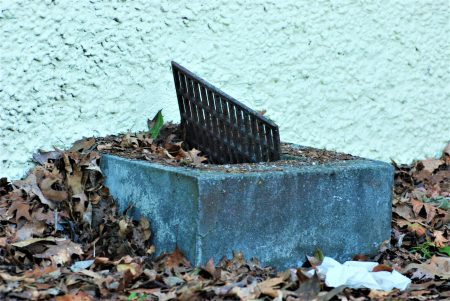ALEXANDRIA — Rapides Parish Assessor Rick Ducote has valued Sheriff Mark Wood’s home in Boyce at $37,000 since at least 2016. Once the sheriff’s homestead exemption is factored in for his primary residence, it means Wood has received a tax bill of $0 for the past seven years.
Yet public records the Illuminator has obtained show Wood has taken multiple loans against his home — a gabled brick home with an in-ground pool that sits on a one-acre lot — worth far more than the figure Ducote has placed on it. In addition, adjoining properties Wood’s immediate family members own have received generous valuations — including a homestead exemption for his mother who died nine years ago.
The sheriff has refused to discuss his property taxes since the Illuminator first began reporting on them in May. He has also declined to respond to questions with respect to the loans he secured for his home.
What knowledge, if any, Ducote has of upgrades at Wood’s home isn’t clear. He has declined to answer questions since the Illuminator reported May 3 on questionably low valuations he provided to multiple elected officials.
Mortgage records with the Rapides Parish Clerk of Court reveal Wood, who signed the documents as required, has borrowed at least twice against his Boyce residence. Wood sought a loan in the amount of $60,000 from Evangeline Bank and Trust in 2010, a year before Ducote was elected assessor, court documents show. The paperwork does not speak to the loan’s purpose or the home’s value.
The responsibility to reassess the value of Wood’s home would have fallen to Ducote in 2012. But even after valuations in 2016 and 2020, tax records show Wood’s stayed at $37,000.
Wood’s second loan was for $118,000 in 2018, secured through First Federal Bank of Louisiana, and the loan documents are equally silent on purpose and value.
According to the Bankers Trust Education Center, lenders rarely approve loan amounts higher than a home’s value, which a third-party appraiser determines as part of the approval process. An exception seldom made might occur when a homebuyer is willing to pay more than a property’s listed selling price. It could result in the home’s appraised value being less than the purchase amount.
But this scenario is inapplicable to Wood’s loans because the sheriff already owns the home he was borrowing against. Home improvement loans are typically meant to cover the cost of the project being undertaken.
GET THE MORNING HEADLINES DELIVERED TO YOUR INBOX
Sheriff’s sisters, late mother receive $0 tax bills
Beyond the sheriff’s residence, tax records reveal some of Wood’s closest relatives who live nearby have also received low valuations and paid no taxes on them as a result.
According to the assessor’s records, Wood’s sisters — Debra Boykin and Roxie Rachal — have paid no property tax on their homes since at least 2016, which is as far as the assessor’s online records go back. Boykin’s ranch-style home is set on six residential acres recessed hundreds of yards back from its country lane; Rachal’s brick-and-siding home sits in an arbor of mature shade trees on six residential acres on a private country road named for her husband.
Next to the Rachals’ home is a parcel of 5.5 residential acres belonging solely to Roxie Rachal, for which she receives an additional homestead credit. It is unclear on what basis the homestead credit is assigned, as there is no dwelling on the property, or why she should have the benefit of two homestead exemptions, which is clearly prohibited by law.
The sheriff’s late mother, Katherine Wood, who died a widow in 2014, remains listed as the owner of her home that abuts her children’s. A homestead exemption, which a homeowner receives only for their primary residence, was applied to the Katherine Wood property to lower its taxable value.
This might change for 2023. The assessor recently reduced his valuations of the late Katherine Wood’s property from $53,000 to $17,000, removing its homestead credit. The projected tax bill for the address is $208.94. Earlier this month, the assessor’s online records showed a total tax bill of $0 — the same amount owed since at least 2016.
The sheriff has refused to field questions about his family’s property valuations and tax bills. Without his confirmation, it’s not certain who, if anyone, lives in his mother’s former home. The Illuminator attempted to contact Boykin by text and voicemail about her own valuation and to clarify the ownership and tax responsibility of her mother’s property. Rachal could not be reached.
One member of the Wood family has received appreciable tax bills, however.
The sheriff’s brother, Michael Wood, lives on one residential acre and six timber acres near his siblings. He has seen his tax bill go down since Ducote became assessor but still pays considerably more than his siblings. His property valuation of $129,720 has been consistent throughout a period of fluctuating tax bills.
Up until 2017, Michael Wood paid $817.98 with the homestead credit applied to his house. After that, his bill dropped to $553.10 and was incrementally increased four times over the ensuing years to its current amount of $672.57. Michael Wood could not be reached for comment.
Michael Wood has other holdings in Boyce: A commercial acre and building valued at $12,000 for which he pays $190.50; six timber acres valued at $1,720, for which he pays nothing; and another residential acre valued at $2,000 for which he pays $24.57.
When asked by email about valuations for the Wood family, Ducote refused to provide details
“These are private citizens, not elected officials,” the assessor said. “I do not discuss anyone’s assessment with others and will not here.”
The home property of Roxie and Michael Rachal sits on six residential acres in Boyce. The Rapides Parish Assessor valued the property for tax purposes at $44,000, resulting in a $0 tax bill. (Photo by Frances Madeson)
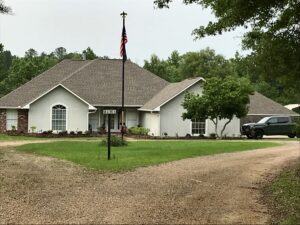
The home property of Michael Wood sits on one residential acre and six timber acres valued by the assessor for tax purposes at $129,720, resulting in a tax bill of $672.57. (Photo by Frances Madeson)
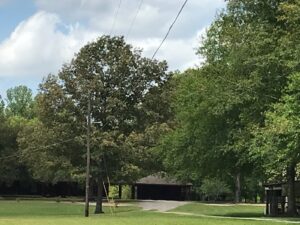
The home property of Debra Boykin sits on six residential acres in Boyce. The Rapides Parish Assessor valued the property for tax purposes at $48,000, resulting in a $0.00 tax bill. (Photo by Frances Madeson)

The home property of Debra Boykin sits on six residential acres in Boyce. The Rapides Parish Assessor valued the property for tax purposes at $48,000, resulting in a $0.00 tax bill. (Photo by Frances Madeson)
Sheriff remodels were not permitted
The Illuminator’s public records request to the Rapides Area Planning Commission (RAPC) revealed Sheriff Wood did not obtain building permits or pay the requisite fees for “a roofed front porch and screened-in deck, which was only recently added on” according to a KALB-TV report.
There are no permits on file with the planning commission for Sheriff Wood’s home other than the 2018 installation of a utility pole for an RV connection, RAPC Executive Director Matt Johns wrote in an email to the Illuminator.
According to the building code enforcement section on the RAPC website, any type of construction in the parish requires a permit from the agency. This includes an addition to an existing structure or remodeling.
By not pursuing proper permitting, the sheriff may have left himself vulnerable to enforcement of Louisiana law on building and zoning regulations. Penalties for violations are fines between $10 and $25 dollars or a prison sentence not to exceed 30 days for each day that the violation exists.
It’s not known how long it took to build the screened-in deck or the roof over the sheriff’s porch.
RAPC Executive Director Matt Johns confirmed in an email that Wood’s remodels would require a permit.
“If constructed after the adoption of the state building codes, a porch addition would qualify as needing a permit and inspections,” Johns wrote.
If the sheriff applied for a permit after the construction was completed, the parish would be allowed to double the fee it charges.
“If citizens didn’t pull a permit out of genuine ignorance (keep in mind that building permits in rural areas are still relatively new), we typically wouldn’t charge the double fee, as they are likely to have other additional costs for (a project) going out of order anyway,” Johns wrote.
What the assessor should have known
The multiple times Sheriff Wood borrowed against his property value and any sizable home improvement projects he embarked upon would have generated a trail of records for an assessor to adjust his valuation for tax purposes, experts say.
Shannon Hiss, an assessment adviser with the International Association of Assessing Officers, a professional organization, told the Illuminator via email that in states where assessors have access to mortgage documents, such as Louisiana, IAAO encourages them to seek that information as part of the process to validate sales.
“Having access to that information ensures the assessor is not only working with accurate information regarding the sales, but also ensures that the sales being used as comparables are truly open market sale transactions and the transaction price reflects only the value of the real estate involved in the sale transaction,” Hiss said.
When mortgages are recorded in parish court, they are not automatically sent to the assessor’s office, Rapides Clerk of Court Robin Hooter said in an email.
“Mortgages and conveyances are public record, however,” Hooter said. “You would need to contact the assessor to see how he gets them.”
Johns, with the Rapides Area Planning Commission, said his agency has provided the assessor’s office with direct access to its permitting software.
“The (assessor’s) staff there run reports within the software regularly to assist in their work,” Johns said.
But because Sheriff Wood did not apply for permits on his home remodeling, the assessor would not have found any records to adjust his valuation.
Read the full article here



